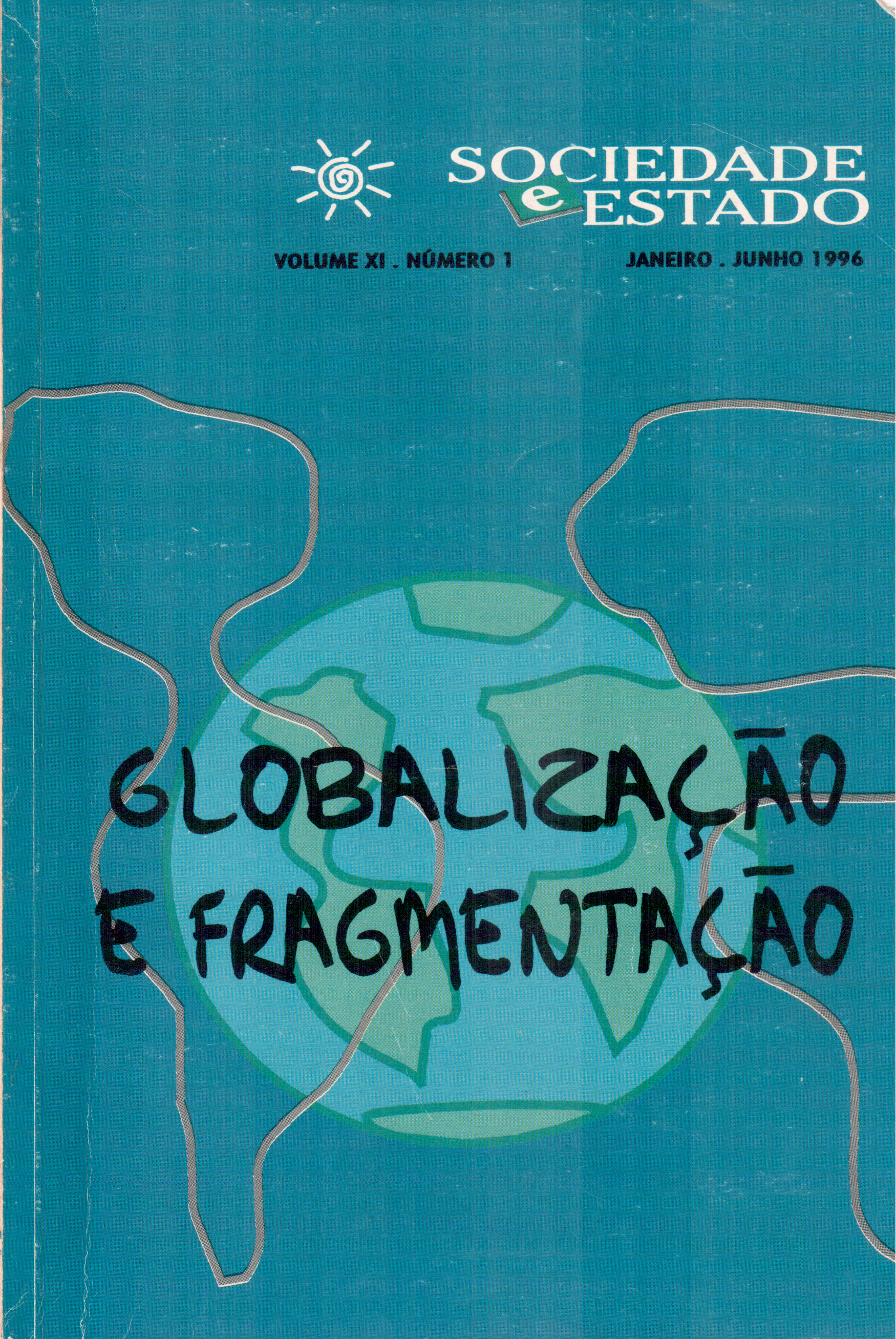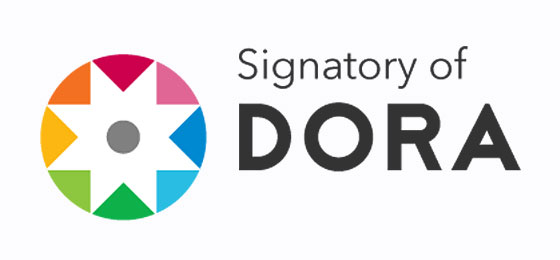FRAGMENTAÇÃO DAS CIÊNCIAS SOCIAIS E RECOMBINAÇÃO DE ESPECIALIDADES EM TORNO DA SOCIOLOGIA
Keywords:
.Abstract
The main idea in this article is that scientific progress occurs largely through the recombination of specialities deriving from the fragmentation of disciplines. The social sciences are genetically programmed to produce hybrids. A varied and complex network of hybrid fields thus comes into being, with the result that the old world map of the social sciences is becoming barely recognizable.
Downloads
References
Almond, G. A. (1990) A Discipline Divided. Schools and Sects in Political Science. Newbury Park, Calif.: Sage.
Andreski, S. (1975) Les sciences sociales: sorcellerie des temps modernes. Paris: PUF.
Andrews, W. G. (ed.) (1988) “O impacto do contexto político sobre a ciência política”. Congresso Mundial de Ciência Política, Washington (não publicado).
Annales, Les. (1989) “Teutons l’expérience”. Annales, Vol. 44, n.° 6, novem- bro-dezembro.
Balandier, G. (1969) Anthropologie Politique. Paris: PUF.
Beaud, M. (1991) “Economie, théorie, histoire: essai de clarification”. Revue économique, n.° 2.
Benson, O. (1967) “The Mathematical Approach to Political Science”, in Charlesworth, J. C. (ed.), Contemporary Political Analysis.
Berelson, B. (ed.) (1963) The Behavioral Sciences Today. New York: Basic Books.
Bernard, J. (1983) Le sang et I’histoire. Paris: Buchet-Chastel.
Blang, M. (1976) “Khun versus Lakatos on Paradigms versus Research Programs in the History of Economics”, in Latsis, J., Methods and Appraisal in Economics. Cambridge: Cambridge University Press, p. 149-70.
Braudel, F. (1960) “Histoire et sociologie”, in Gurvitch, G., op. cit., p. 82-93.
Brunet, R. (1982) “La géographie”, in Godelier, M. (ed.), Les sciences de I’homme et la société. Paris: La Documentation Française.
Brunk, G. G. (1989) “Social Science Journals: A Review of Research Sources and Publishing Opportunities for Political Scientists”, in Political Science, set., p. 617-27.
Certaines, J. D. (ed.) (1976) “La biophysique en France: critique de la notion de discipline scientifique”, in Lemaine et al., op. cit., p. 99-122.
Chaunu, P. (1979) Le courrier du MRS. n.° 3, julho, p. 5.
Deutsch, K. W„ Markovits, A. e Platt, J. (1986) Advances in the Social Sciences 1900-1980, What, Who, Where, How? Cambridge: University Press of America.
Dogan, M., e Pahre, R. (1990) Creative Marginality: Innovation at the Intersections of Social Sciences. Boulder, Col.: Westview Press.
Easton, D. e Shelling, C. F. (1991) Divided Knowledge, Across Disciplines, Across Cultures. Newbury Park, Calif.: Sage.
Eliade, M. (1977) “Religions”, in International Social Science Journal, Vol. XXIX, n.° 4, p. 615-27 (Número especial sobre “Facetas da interdisciplina- ridade”).
Frieden, J. A. e Lake, D. A. (eds.) (1991) International Political Economy. New York: Saint-Martin Press.
Giddens, A. (1987) “Weber and Durkheim: Coincidence and Divergence”, in Mommsen and Osterhammel, op. cit.
Gilfillan, S. C. (1965) “Roman Culture and Oxygenic Lead Poisoning”. Mankind Quarterly, Vol. 5, n.° 3, p. 3-20.
Greenstein, F. J., e Polsby, N. W. (eds.) (1975) Handbook of Political Science, vol. VIII, Cumulative Index. Reading, Mass.: Addison-Wesley.
Gurvitch, G. (ed.) (1960) Traité de sociologie, 2 vol. Paris: PUF.
Izard, M. (1988) “Presentation de lAnthropologie politique aujourdhui”, in Revue Française de Science Politique, vol. 38, n.° 5, outubro.
Jacob, F. (1975) “Biologie moléculaire: la prochaine étape”, in La recherche en biologie moléculaire, op. cit. p. 57-62.
Jones, E. (1979) “Geography. New Perspectives on an Old Science”, in Rokkan, S. (ed.), A Quarter of a Century of international Social Science. Delhi: Concept Company, p. 95-110.
Klausner, S. Z. (ed.) (1967) The Study of Total Societies. Garden City, N. Y.: Anchor Books.
Kourilsky, F. (1990) “Introduction”, in Actes du colloque Carrefour des sciences. Paris: CNRS, p. 13-17.
Kuhn, T. (1970) The Structure of Scientific Revolutions. University of Chicago Press, 2.a ed.
Laponce, J. (1983) “Political Science and Geography”, in International Social Science Journal, p. 449-58.
Laponce, J. (1988) “Political Science and Interdisciplinarity”. Report of the World Congress on Political Science, Washington.
Laponce, J. (1989) “Political Science: An Import-Export Analysis of Journals and Footnotes”, in Political Studies, p. 401-19.
Le Goff, J. (1991) “Discours lors de la reception de lamedailled’or du CNRS”.
Lemaine, G., MacLeod, R., Mulkay, M., e Weigast, P. (eds.) (1976) Perspectives on the Emergence of Scientific Disciplines. The Hague: Mouton.
Lesoume, J. (1990) “Une science balkanisée”, in Le Monde, 16 de outubro.
Lipset, S. M. (1969) Politics and the Social Sciences. New York: Oxford University Press.
Martinelli, A., e Smelser, N. Y. (1990) “Economic Sociology, Historical Threads and Analytic Issues”, Current Sociology, Vol. 38, n.° 2, outono, p. 247-72.
Mitchell, M. W. (1969) “The Shape of Political Theory to Come: From Political Sociology to Political Economy”, in Lipset, S. M. (ed.), op. cit. p. 101-36.
Mikesell, M. W. (1969) “The Borderlands of Geography as a Social Science”, in Sherif, M., Interdisciplinary Relationships in the Social Sciences. Chicago: Aldine, p. 227-48.
Mommsen, W. J. e Osterhammel, J. (1987) Max Weber and his Contemporaries. London: Allen & Unwin.
Morin, E. (1990) “De l’interdisciplinarité”, in CNRS, Actes du colloque Carrefour des sciences. Paris: CNRS, p. 21-39.
OECD (Organization for Economic Co-operation and Development). (1972) Interdisciplinarity, Problems of Teaching and Research in Universities. Paris: OECD.
Proust, J. (1991) “L’interdisciplinaritd dans les sciences cognitives”. Relatório para a Unesco.
Runciman, W. G. (1962) Social Science and Political Theory. Cambridge: Cambridge University Press.
Sachs, I. (1991) “Le développement: un concept transdisciplinaire par excellence”. Relatório para a Unesco.
Sarouf, F. J. (1965) Political Science, an Informal Overview. Columbus, Ohio: Merrill.
Sarton, G. (1927) Introduction to the History of Science. New York: Williams & Wilkins.
Sills, D. L. (1986) “A note on the Origin of Interdisciplinarity". ITEM, Social Science Research Council, março.
Smelser, N. (ed.) (1988) Handbook of Sociology. Beverly Hills: Sage Publications. Stoetzel, J. (1963) La Psychologie sociale. Paris: Flammarion.
Thuillier, P. (1975) “Comment est née la biologie moléculaire,” in La recherche en biologie moléculaire, op. cit. p. 13-36.
Turner, H. (1991) “The Many Faces of American Sociology. A Discipline in Search of Identity”, in Easton, D. e Schelling, C., op. cit. p. 59-85.
Valadi, B. (1990) Pareto: la naissance d’une autre sociologie. Paris: PUF.
Various. (1975) La recherche en biologie particulaire. Paris: Seuil.
Wallerstein, I. (1976) The Modern World System,. Vol. I, p. 11. New York: Academic Press.
Downloads
Published
How to Cite
Issue
Section
License
Copyright (c) 2022 Revista Sociedade e Estado

This work is licensed under a Creative Commons Attribution-NonCommercial 4.0 International License.




.jpg)



















